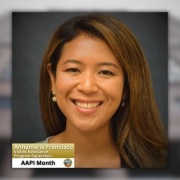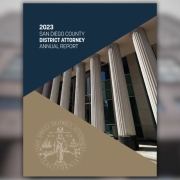South Bay Pastor Charged for Failing to Report Suspected Sexual Abuse
San Diego County District Attorney Summer Stephan announced today that a South Bay pastor has been charged with failure to report known or suspected child abuse in his role as a legally mandated reporter. Eric Manuel Merino, 43, a pastor at Victory Outreach Church in San Ysidro was arraigned in San Diego Superior Court today on one misdemeanor count.
The case against Merino is connected to the sexual abuse of a teenager at the hands of church choir leader Rafael Valentin Magana. Magana, 27, was convicted in April of one felony count of a lewd act upon a child 14 or 15 years of age. He will be required to register as a sex offender and faces up to three years in prison when he is sentenced on June 18.
The sexual abuse was reported to Pastor Merino, triggering his legal duty to notify law enforcement or child welfare services. However, Merino failed to do so.
“Youth in San Diego County deserve to have a safe and healthy environment, free of sexual or physical abuse — whether at school or at church,” DA Stephan said. “When that kind of abuse does happen, it’s critical that those incidents don’t fall through the cracks and that the people in positions of authority follow their duty to report suspected abuse so victims can be supported, and abusers can be held responsible for their crimes. Following the law of mandated reporting can potentially protect another child from being sexually abused by the perpetrator.”
California law mandates that certain professionals, known as mandated reporters, must report any suspected cases of child sexual abuse. These individuals include clergy members, teachers, doctors, social workers, police officers, and other professionals who regularly work with children. Under the California Child Abuse and Neglect Reporting Act (CANRA), these mandated reporters are legally required to report their suspicions to child protective services or law enforcement immediately, and they must submit a written report within 36 hours. Failure to comply with these reporting requirements can result in criminal penalties, including fines and incarceration. The law is designed to ensure prompt intervention to protect children from harm.
If convicted of the charge, Merino faces up to six months in jail and a $1,000 fine.
The District Attorney’s Office maintains a Student Safety in School Systems Task Force, which works to make sure that mandated reporters are complying with their legal obligations to report known or suspected acts of physical and sexual abuse against minors that occur in San Diego County.
This case is being prosecuted by Deputy District Attorney Kristi Gill in the DA’s Special Operations Division. The division and the Task Force review allegations where mandated reporters of sexual or physical abuse fail to comply with their legal duties.
More information about the Task Force and how to report suspected abuse can be found at https://www.sdcda.org/helping/studentsafety/.










